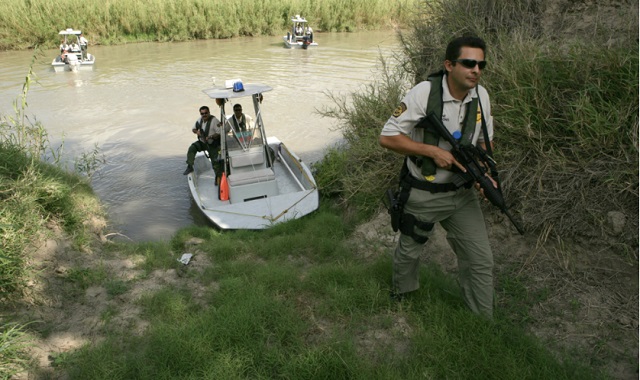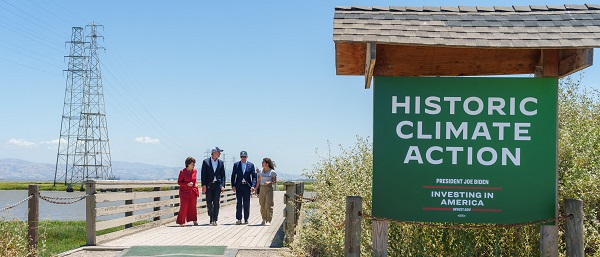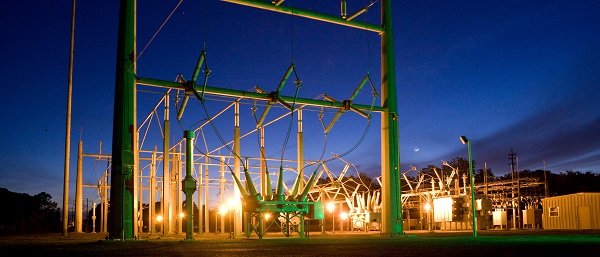illegal immigration
More than 205,000 illegal border crossers in June, 2.5 million in fiscal 2024

Border Patrol agents inspect a potential landing spot for illegal immigrants along the Rio Grande River in Texas.
From The Center Square
By
There were more than 205,000 illegal border crossers apprehended in June, according to new U.S. Customs and Border Protection data released on Monday.
June’s numbers bring the total number of illegal border crossers this fiscal year to more than 2.4 million.
The majority of illegal border crossers were apprehended at the southwest border last month, totaling more than 130,000. Fiscal year to date, more than 1.82 million were apprehended at the southwest border.
At the northern border, more than 17,700 were apprehended last month, the greatest number apprehended for the month of June in U.S. history. Nearly 145,000 have been apprehended at the northern border this fiscal year.
The fiscal year goes from Oct. 1 to Sept. 30.
The overwhelming majority of illegal border crossers were single adults, as they have been every month. Fiscal year through June, more than one million single adults illegally entered the country, according to the data. The next greatest number of illegal border crossers for the fiscal year totals nearly 700,000 of individuals claiming to be in a family unit.

When reporting the data, CBP said, “Border Patrol encounters between ports of entry were 29% lower than in May 2024 and were the lowest monthly total for the Border Patrol along the southwest border since January 2021 as well as lower than the number of encounters between ports of entry in June 2019.”
U.S. House Committee on Homeland Security Chairman Mark Green, R-Tenn., disagreed, arguing last month’s numbers were just “another month, another devastating number of inadmissible aliens entering and being released into the United States – all at the invitation of President Biden and now-impeached DHS Secretary Alejandro Mayorkas.”
Green led the charge to impeach Mayorkas on grounds he failed to secure the border. Mayorkas in February was the first sitting cabinet member to be impeached in U.S. history, The Center Square reported.
CBP official Troy Miller said the decrease in illegal border crossings was due to “recent border security measures” that made “a meaningful impact on our ability to impose consequences for those crossing unlawfully.”
Miller is performing the duties of commissioner after CBP’s former commissioner, Chris Magnus, was forced to resign in November 2022 after being on the job for 11 months. Magnus resigned after being widely criticized for his handling of an influx of illegal border crossers and after numerous officials complained, including the Arizona Sheriff’s Association, which had warned that he was unqualified and opposed his nomination, The Center Square reported.
Miller claimed because of a new rule issued by Mayorkas, the number of encounters at the southwest border decreased by more than 50% in the past six weeks.
But Green and others argue that, because of new parole programs Mayorkas created, monthly encounters at ports of entry of foreign nationals with no lawful basis to enter increased exponentially under the Biden administration, from nearly 20,000 in January 2021 to more than 117,000 in June 2024.
The total number, which has traditionally measured entry between ports of entry and at ports of entry, does not fully reflect the number of foreign nationals illegally entering the country because of the parole programs, critics argue. Hundreds of thousands have been flown in using a newly created CBP One mobile app, for example.
Nearly 42,000 foreign nationals were brought into the country last month through the app, according to CBP data. Since it was launched in January 2023, more than 680,500 foreign nationals used it to schedule appointments and arrive at ports of entry.
The Biden administration strategy “should now be plain to everyone: flood the country with as many illegal aliens as possible between ports of entry, and then create unlawful mass-parole programs like CBP One and CHNV to encourage otherwise-inadmissible aliens to still enter – just in a less politically embarrassing and damaging way,” Green said.
In addition to the app, Mayorkas also created and expanded parole programs (CHNV) specifically to allow Cuban, Haitian, Nicaraguan and Venezuelan nationals to enter the country who under the law are not permitted to enter. So far, “about 494,799” arrived on commercial flights and were granted parole through the CHNV parole process, according to CBP data.
They include 106,757 Cubans, 205,026 Haitians, 93,325 Nicaraguans, and 118,706 Venezuelans who were “vetted and authorized for travel,” CBP says. Among them, 104,130 Cubans, 194,027 Haitians, 86,101 Nicaraguans, and 110,541 Venezuelans were granted parole and released into the U.S.
The CHNV parole process has been directly linked to violent crimes being committed against Americans, as reports indicate those being released were not being properly vetted, if at all, The Center Square reported. Despite CBP’s claims, DHS Inspector General reports found Border Patrol agents weren’t vetting everyone apprehended and released and ICE agents weren’t detaining them.
Business
Truckers see pay surge as ICE sweeps illegal drivers off U.S. highways

Quick Hit:
American truckers say they’re finally earning more per mile as President Donald Trump’s enforcement push clears illegal drivers off U.S. highways. Truckers have reported 50% pay increases on some routes following a surge of ICE activity and Transportation Secretary Sean Duffy’s crackdown on safety and work permit violations.
Key Details:
- A trucker on X said his usual Chicago-to-Fargo run jumped from $1,200 to $1,800, crediting the Trump administration’s immigration enforcement for thinning out illegal competitors.
- ICE and federal transportation officials have detained or removed illegal drivers in multiple states, with reports of Serbian and Indian drivers losing their commercial licenses after failing to prove legal entry into the U.S.
- FreightWaves founder Craig Fuller noted spot rates have risen about 2% despite weak demand, as “bottom feeders” who undercut prices are being “squeezed out of the market.”
Diving Deeper:
As President Trump’s immigration enforcement intensifies, American truckers are seeing something rare in a sluggish cargo economy: rising wages. Across online freight boards and social media, truckers are crediting the administration’s “Compliance Crunch” — a combination of ICE raids and new safety regulations — for clearing out illegal drivers who had been depressing pay rates for years.
One trucker wrote on X that his typical Chicago-to-Fargo route, which paid $1,200 before the election, now brings in $1,800. “Needless to say, I took him up on the offer,” he posted. “Lord do I hope this hangs around a little bit.”
Transportation Secretary Sean Duffy has been enforcing long-ignored safety and documentation rules, targeting companies that hired drivers without valid immigration status or complete customs paperwork. “We have Americans who’ve been in trucking for 50 years through family businesses,” Duffy told Fox News on October 8. “They can’t do business anymore because you have these illegals coming in, living out of their trucks… they can’t speak the language, and they come in under price — way under price.”
According to reports from The Serbian Times, at least fifteen Serbian drivers have been detained in recent days, and agents have begun seizing commercial driver’s licenses from migrants lacking proof of legal entry. Many of these drivers, primarily from Eastern Europe and South Asia, were able to operate under the Biden administration with minimal oversight — often undercutting legitimate American drivers by accepting lower pay.
Craig Fuller of FreightWaves observed that even though freight volumes remain “anemic,” per-mile spot rates rose roughly 2% as noncompliant firms exit the market. “We are seeing the bottom feeders get squeezed out,” he wrote, adding that most contract carriers haven’t yet felt the wage impact but likely will as enforcement spreads.
Industry experts say nearly one-third of the nation’s freight has been hauled by non-citizen drivers, which trucking analyst Bill Skinner called “not just a safety issue — it’s a national security risk.”
While some corporate logistics networks such as Amazon and Walmart may eventually argue that higher trucking wages could drive up costs, analysts note that the increases are modest and likely offset by fewer accidents, delays, and fraud cases tied to unlicensed or illegal operators.
illegal immigration
$4.5B awarded in new contracts to build Smart Wall along southwest border

Homeland Security Secretary Kristi Noem rides an ATV along the U.S.-Mexico border wall in El Paso, Texas, on April 28, 2025. Photo: Tia Dufour / U.S. Department of Homeland Security
From The Center Square
By
New contracts to add 230 miles of barriers, nearly 400 miles of technology
Roughly $4.5 billion in contracts have been awarded to expand border wall construction, including adding advanced technological surveillance along the southwest border.
Ten new construction contracts have been awarded through the U.S. Department of Homeland Security and U.S. Customs and Border Protection to add hundreds of miles of Smart Wall in California, Arizona, New Mexico and Texas.
“For years, Washington talked about border security but failed to deliver. This President changed that,” CBP Commissioner Rodney Scott said. “The Smart Wall means more miles of barriers, more technology, and more capability for our agents on the ground. This is how you take control of the border.”

Scott has championed advancing a Smart Wall border security system for years. A border security system is far more than a wall, he has told The Center Square, it’s an ecosystem.
The system encompasses steel and waterborne barriers, patrol roads, lights, cameras, advanced detection technology, including towers and aerostats, to provide Border Patrol agents with a range of tools to detect and interdict illegal activity.
CBP has published an interactive map to educate the public about the Smart Wall system. The map highlights areas of the 1,954-mile U.S.-Mexico border where wall construction has been completed, where border wall panels or waterborne barriers are under construction, where contracts have been awarded for proposed projects in the design phase or early construction, and planned construction areas that haven’t yet been awarded contracts.
Prior to Jan. 20, 2025, 702 miles of existing barriers had been constructed of primary wall and 76 miles of secondary wall, according to CBP data.
The new plan includes implementing barrier technology along 532 miles of the border where no barrier exists because of unfavorable terrain or remote location. It also includes deploying 550 miles of technology throughout previously constructed barriers, CBP says. Specific areas are also being built out in regions where contracts were previously canceled by the Biden administration.
In California, $483.5 million in taxpayer funding was awarded to BCCG Joint Venture for the Diego 1 Project to construct nine miles of new Smart Wall and 52 miles of system attributes in the San Diego Sector.
An additional $574 million was awarded to Fisher Sand & Gravel Co. for the El Centro 1 Project to construct eight miles of Smart Wall and install 63 miles of system attributes in the San Diego and El Centro sectors.
In California and Arizona, $199.5 million was awarded to Barnard Spencer Joint Venture for the Yuma 1 Project to construct 60 miles of system attributes in the Yuma Sector.
In Arizona, nearly $607 million was awarded to BCCG for the Tucson 1 Project to construct 23 miles of new secondary border wall and 66 miles of system attributes in the Tucson and Yuma sectors.
In New Mexico, $155.1 million was awarded to BCCG for the El Paso 1 Project to replace seven miles of old dilapidated barrier fencing in the Santa Teresa Area of Responsibility with a new Smart Wall. BCCG will also complete 22 miles of system attributes in the El Paso Sector in New Mexico.
Also in the El Paso Sector in New Mexico, Barnard Spencer Joint Venture was awarded nearly $579 million for the El Paso 2 Project to construct 23 miles of new Smart Wall and 81 miles of system attributes.
In the El Paso Sector in far west Texas, BCCG Joint Venture was awarded $850.4 million for the El Paso 3 Project to construct 42 miles of new primary Smart Wall, six miles of new secondary border wall and 46 miles of system attributes.
In Texas, BCCG Joint Venture was awarded $565 million for the Del Rio 1 Project to construct 22 miles of new primary Smart Wall, replace two miles of old barrier wall, and deploy 40 miles of waterborne barrier system in the Eagle Pass Area of Responsibility in the Del Rio Sector.
BCCG was also awarded $364.3 million for the Del Rio 2 Project to construct 10 miles of new primary Smart Wall, 23 miles of waterborne barrier system, and install 10 miles of system attributes in Eagle Pass.
BCCG was also awarded $96.1 million for the Rio Grande Valley Waterborne Barrier Project to deploy 17 miles of waterborne barrier in the Rio Grande River, south of Brownsville in Cameron County in the Rio Grande Valley Sector.
Another $550 million worth of contracts was also awarded to support Smart Wall construction. Additional construction and contracts are expected.
Funding for the projects comes from the “One Big Beautiful Bill,” which President Donald Trump signed into law. It also includes some fiscal year 2021 border wall appropriations that were frozen during the Biden administration.
Waivers were also issued by DHS Secretary Kristi Noem to expedite construction of nine miles in the San Diego Sector and 30 miles in the El Paso Sector in New Mexico. Both sectors were inundated with record high illegal traffic during the Biden administration.
-

 Daily Caller2 days ago
Daily Caller2 days agoUtah Republican Senator Planning To Attend Big Globalist Climate Shindig Despite Trump’s Energy Policies
-

 International1 day ago
International1 day agoNumber of young people identifying as ‘transgender’ declines sharply: report
-

 Energy1 day ago
Energy1 day agoIndigenous Communities Support Pipelines, Why No One Talks About That
-

 Business1 day ago
Business1 day agoFinance Committee Recommendation To Revoke Charitable Status For Religion Short Sighted And Destructive
-

 Business23 hours ago
Business23 hours ago“Nation Building,” Liberal Style: We’re Fixing a Sewer, You’re Welcome, Canada
-

 Business2 days ago
Business2 days agoFinance Titans May Have Found Trojan Horse For ‘Climate Mandates’
-

 Bruce Dowbiggin23 hours ago
Bruce Dowbiggin23 hours agoLong-Distance Field Goals Have Flipped The Field. Will The NFL Panic?
-

 Alberta1 hour ago
Alberta1 hour agoClick here to help choose Alberta’s new licence plate design



